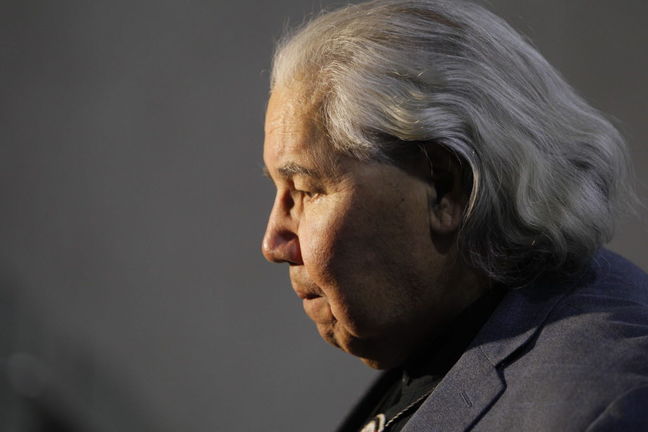Sinclair Issues Challenge to Help Heal Pain of Schools
By Ashley Prest
Justice Murray Sinclair, the head of a commission investigating the excesses of Indian Residential Schools, said on Thursday that a fundamental change in attitudes and recognition of the past were vital to heal the harm and alienation inflicted by more than a century of mistreatment. Sinclair chairs the Truth and Reconciliation Commission of Canada, due to report next June on the effects of the 142 government-run schools on the more than 150,000 aboriginal children taken from their homes and uprooted from their culture starting in the 1870s. The last such institution closed in 1996. In an address to several hundred spectators at the University of Manitoba’s Engineering and Technology Complex entitled "If You Think Truth is Hard, Reconciliation is Harder," he challenged everyone to help make the necessary change. Sinclair said the key to moving on from the suffering and shame will hinge on recognition of what took place. "Things are going to change and if they’re going to change, we need to set the terms of what those future changes are going to result in." he said. "Reconciliation is a hard road." Sinclair said the commission had conducted four years of hearings and investigations and compiled accounts in video and spoken word from 7,000 survivors. The groundwork had already begun to include the commission’s findings and the history of the IRS system in school curriculums across the country. "Getting people to understand will allow us to appreciate the significance of putting changes into our curriculum so that there is a more balanced approach to the teaching of Canadian history and about aboriginal people," Sinclair said. He said commission members have met ministers of education from across Canada twice in their annual meetings to "convey to them the importance of curriculum change." "But also (to convey) the question of holding them accountable to ask them to show us what they’re going to be doing. They’ve been very co-operative and I must say, very anxious to make sure they do the right thing," Sinclair said. "They know, as do many leaders in Canadian society, that things are changing and they have to keep ahead of the change so they have some input as to where that change is going to take us." Sinclair was speaking at the U of M, site of the national research centre and archives for the commission, as the 2014 Distinguished Knight Visitor as part of a special enrichment program to assist academics and the community at large. Knowing the truth, he said, will allow everyone — indigenous and non-indigenous — to move forward to a shared future. "It is about creating a relationship founded on mutual respect between aboriginal and non-aboriginal people. It is through the establishment of relationships that we are going to be able to achieve a good nation," he said. He said neglect, abuse and oppression suffered by the incarcerated children constituted genocide under the terms of the Geneva Convention definition and it was up to this generation to start down the path of reconciliation. "The importance of fixing it is all of our responsibilities. We have to find a way to get our leaders to set directions for the way we need to follow," he said. "It was originally intended by the indigenous people to find a way in which we can co-exist and share this territory and get along with each other. Now it needs to be readdressed because the aboriginal population is growing. It’s the fastest growing population in Canada." Today’s adults, he said, are going to inherit the responsibility of moving forward. Answering questions, Sinclair said there was no longer any place for people who say they do not wish to know, who say they weren’t there and express no interest in the history of the residential schools. "There’s a segment of the population who refuse to accept any responsibility because they weren’t there," Sinclair said. "My comment to them is you may not be connected to the past but you are connected to the future. What do you do to accept responsibility for the future? That’s the question they need to be asked." Contact: ashley.prest@freepress.mb.ca
|
.
Any original material on these pages is copyright © BishopAccountability.org 2004. Reproduce freely with attribution.
